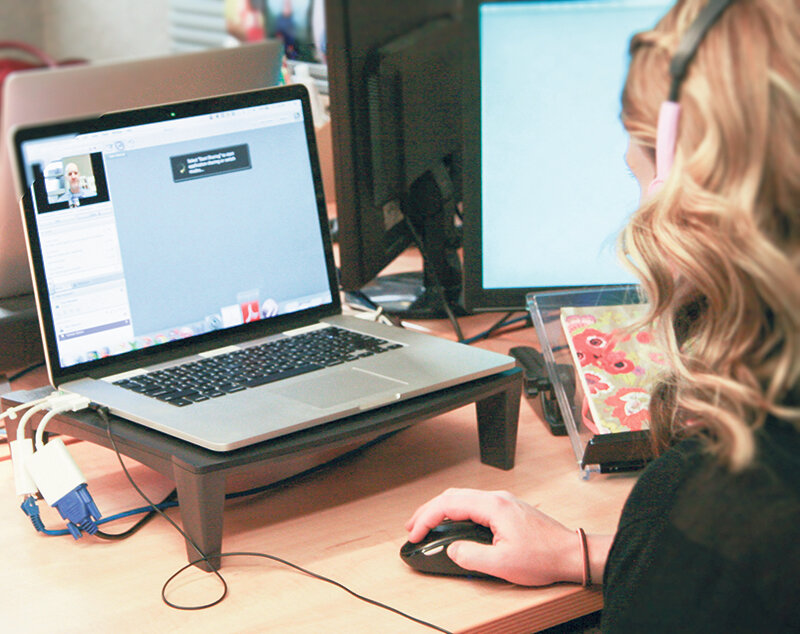Enabling instructor and student success in online learning
Lethbridge College’s free Facilitating Online Learning course conveys strategies for successful web-enabled engagement and student retention. Registration for the program has spiked as institutions move to online delivery. supplied
When educators sign up for the Facilitating Online Learning course offered by Lethbridge College, they receive a welcome message from Jess Nicol with an invitation to post a brief introduction and a picture of their pet if they have one. While the pet picture is unlikely to be relevant to their expertise, this light-hearted personal touch signals that they’re dealing with “a real human being,” says Dr. Nicol. “It’s one of the ways we establish our social presence as facilitators and let participants know we’re approachable and here for them.”
The course has recently been redeveloped in response to the coronavirus pandemic, which caused educational institutions to quickly shift to online delivery, according to the development and facilitation team – Andy Benoit, Jess Nicol and Joelle Reynolds – from Lethbridge College’s Centre for Teaching, Learning and Innovation.
When they joked that the course might go viral, they were not far off. “Initially, we hoped for about 50 people to sign up – and now we have over 600,” says Mr. Benoit, adding that the course is open until the end of June. “We first had a big spike in numbers from instructors within our own institution and soon realized that the course might also be useful for educators from other institutions.”
Facilitating Online Learning is available for free to all post-secondary institutions and faculty members and enables educators to learn practical strategies in six to 10 hours. It has attracted participants from across Canada as well as abroad, with one living as far away as Melbourne, Australia. “Online education enables people to learn from anywhere and connect on numerous platforms,” says Mr. Benoit, who adds that the diversity of the group enriches the learning experience for everyone.
Even prior to COVID-19, Lethbridge College instructors were integrating Canvas – the Learning Management System used at the institution – into aspects of teaching, and this high level of technological literacy enabled a relatively smooth transition to online delivery, says Mr. Benoit.
However, facilitating online education requires more than being able to navigate technologies and platforms – it also calls for awareness of the major factors that influence student performance and retention, says Ms. Reynolds. “In a classroom setting, when students meet you face to face, they can get a sense of who you are as a person and as a teacher,” she explains. “But online, you have to be more intentional about establishing that connection; for example, by posting a video of yourself and consistently using tools like the calendar or online announcements.”
In addition, instructors can “take advantage of the virtual community to create meaningful engagement,” says Ms. Reynolds.
In the course, participants have been interacting with their peers, says Mr. Benoit, with mechanics, nurses, early childhood educators, accountants, chemists and others all sharing ideas about how to translate hands-on instruction methods into online learning.
Dr. Nicol welcomes this camaraderie. “People are excited to share their ideas and resources – and this can then spark new ideas,” she says. “We’re seeing a lot of innovation and creative thinking around different activities and approaches.”
Mr. Benoit notes that the course was redeveloped based on the Community of Inquiry framework (developed by Garrison, Anderson and Archer), which aims to create deep and meaningful learning experiences through the development of three interdependent elements – social, cognitive and teaching presence. “And now we see a true community of people who are inquiring about how they can facilitate learning for their students,” he says. “This is closing the loop.”
For Ms. Reynolds, it is evident that “online learning is more than just a stopgap – it’s an opportunity,” she says. And Lethbridge College is taking a leadership role in making sure students are going to succeed by helping instructors be prepared for online delivery.
Response to COVID-19 has inspired the development of valuable infrastructure and capacity for online learning, which Mr. Benoit believes will make a return to the “old normal” unlikely. “This will shape the way we’ll move forward. And we’d love to see further efforts to make wrap-around services more robust for online learners,” he says. “There is no downside to that regardless whether courses will happen in classrooms or online.”
For more stories from this feature, visit globeandmail.com

